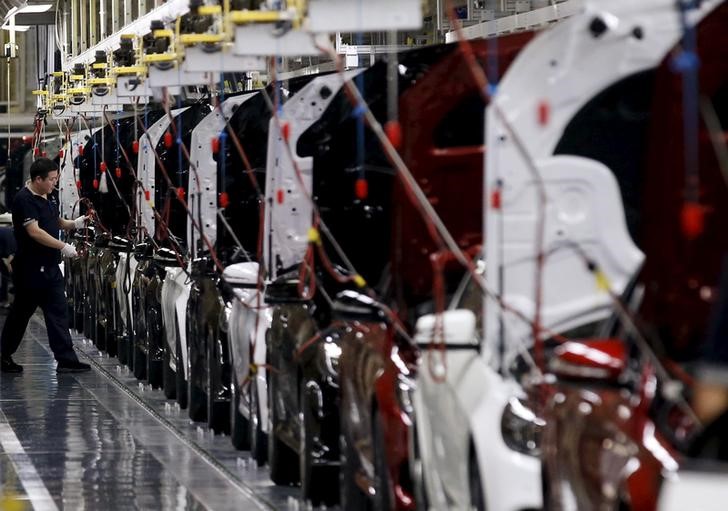By Sumanta Dey and Ian Chua
BENGALURU/SYDNEY (Reuters) - The world economy lost momentum in September, with China's vast factory sector shrinking again and euro zone manufacturing growth weakening slightly, both casualties of waning global demand.
The latest business surveys across Asia and Europe paint a darkening picture and are likely to prompt more calls for central banks around the world to loosen monetary policy even further.
"The data probably increases the case for more stimulus in certain parts of the world, especially from the People's Bank of China and the European Central Bank," said Philip Shaw, economist at Investec in London.
"Those economies that are at less advanced paths of the recovery cycle -- the key example is the euro zone, where we're looking at more disinflation -- may well find more stimulus is in order."
Surveys of China's factory and services sectors showed the world's second largest economy may be cooling more rapidly than earlier thought, with deeper job cuts.
Taken together with a stock market crash in Shanghai during the summer and a surprise devaluation of the Chinese yuan, the data highlight just how difficult it will be for policymakers to steer China's economy out of the biggest slowdown in decades.
"Two straight months of manufacturing sector contraction with a depressed equity market suggests China's third-quarter GDP growth is likely to have slowed to 6.4 percent," economists at ANZ said.
CHINA WORRIES
The Chinese government is due to release third-quarter GDP data on Oct. 19. It reported steady growth of 7 percent in both the first two quarters of the year, a figure that many analysts and investors say is overstating the actual rate.
The official manufacturing Purchasing Managers' Index in China inched up to 49.8 in September from 49.7, but still suggested conditions were deteriorating. A private survey focusing on small factories pointed to an even sharper cooldown. Readings below 50 signal a contraction.
China is a major importer of raw materials, especially from commodity producers such as Australia, South Africa and Canada, and an exporter of finished goods. A slowdown there is likely to be felt in global economies already grappling with weak demand and lacklustre growth and inflation.
Its effects are already being felt by regional trade partners such as South Korea, Vietnam, Malaysia, Indonesia and India where manufacturing activity either contracted or dipped in September.
Concerns over China and global market volatility figured high on a list of reasons the U.S. Federal Reserve did not raise interest rates last month.
A U.S. survey of manufacturers from the Institute of Supply Management due later on Thursday is likely to show factory activity there is dangerously close to contraction, underlining the global nature of the current manufacturing downturn.
The U.S. ISM factory index is forecast to slip to 50.6 from 51.1, according to a Reuters poll of 87 economists.
MORE ECB STIMULUS AS PRICES DROP
Signs that China is losing steam have dented commodity prices, notably oil, and fuelled a global disinflation trend since June last year, leading a record number of central banks to ease policy.
In the euro zone, where the central bank is six months into a 1.1 trillion euro asset purchase programme, inflation dipped below zero again in September, an early estimate showed on Wednesday.
Combined with the PMI survey data that showed factory growth weakened slightly last month, with slowing new orders and output, that is likely to prompt the ECB to expand its stimulus programme.
Markit's final manufacturing PMI was 52.0 last month, lower than August's 52.3. An index measuring output that feeds into a composite PMI, due on Monday and seen as a good guide to growth, fell to 53.4 from 53.9.
ECB policymakers, led by President Mario Draghi, have hinted the 60-billion-euro-a-month bond-buying scheme could be enhanced in size or duration if inflation is seen missing its goal of near 2 percent even by 2017.
With the latest factory PMI showing manufacturers started cutting prices again to drum up new business, it is unlikely inflation will start to rise meaningfully anytime soon.
Factories in Europe's number one economy, Germany, performed better, however, driven by strong output from consumer goods producers and rising new orders.
The PMIs also showed French manufacturing grew faster than first thought in September, while British factory growth lost steam and shed jobs for the first time since 2013.

The drag on the UK economy is likely to weigh on the Bank of England which is considering when the appropriate time is to raise interest rates from the current 0.50 percent, where they have stayed since March 2009.